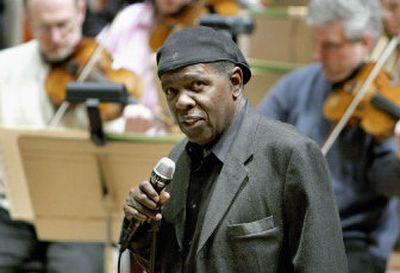Lou Rawls, elegant and versatile singer, dies at 72

Lou Rawls, the elegantly soulful vocalist whose career spanned five decades, died Friday. He was 72.
Rawls died at Cedars-Sinai Medical Center in Los Angeles. He had been hospitalized last month for the treatment of brain and lung cancer, according to his publicist.
As a singer and entertainer, Rawls was not only uncommonly durable. He was also underrated, in part, because he was so versatile and never stuck with one style.
He began as a gospel singer, made his mark in the jazz world, then went on to record a number of soul hits before achieving mainstream pop success in the ‘70s, without ever compromising his easygoing, dignified signature sound.
“His voice just stood out: It was like thunder,” said songwriter and producer Leon Huff who, along with partner Kenny Gamble, scored one of Philadelphia International Records’ biggest hits with Rawls’ 1976 album “All Things In Time.” “He had one of the richest baritone voices I’ve ever heard.”
Born Louis Allen Rawls in Chicago, he grew up admiring jazz singers like Billy Eckstine and Joe Williams, and throughout his career his commanding baritone exuded sophistication. Frank Sinatra – to whom Rawls paid tribute on the 2003 album “Rawls Sings Sinatra” – said Rawls had “the silkiest chops in the singing game.”
Early on, Rawls was a frequent collaborator with Sam Cooke, with whom he sang in the Teenage Kings of Harmony in the early 1950s.
In 1962, Rawls released his debut album, the jazzy “Stormy Monday,” with the Les McCann Trio, and landed his first acting role in the television series “77 Sunset Strip.” (Rawls had many minor roles in films such as “Leaving Las Vegas,” and he had a sideline lending his velvety voice to cartoons such as “Hey Arnold!” and “Garfield.”)
In the ‘60s Rawls developed a trademark style of inserting spoken narrative into songs like “Tobacco Road,” and he evolved as a soul singer, with memorable hits such as “Love Is a Hurtin’ Thing” and the Grammy-winning “Dead End Street.”
He won the second of his three Grammys for his 1971 socially conscious song “Natural Man.” And after a career lull, in 1976 Rawls signed on with Gamble and Huff. His biggest hit, “You’ll Never Find Another Love Like Mine,” melded his sensuous, authoritative vocals with the lush Philadelphia sound, a combination that yielded an array of disco-era hits, including “Lady Love” and “Groovy People.”
In an interview Friday, Huff remembered those days fondly: “He was always very professional working in the studio, a class act. We were really locked into a groove with Lou Rawls.”
In the 1980s and 1990s, Rawls worked as a pitchman for Budweiser, and starred in “Smoky Joe’s Cafe” on Broadway. Beginning in 1982, he served as host for the United Negro College Fund’s annual Parade of Stars telethon.
Rawls is survived by his third wife, Nina, and four children: Louanna Rawls, Lou Rawls Jr., Kendra Smith and Aiden Rawls.